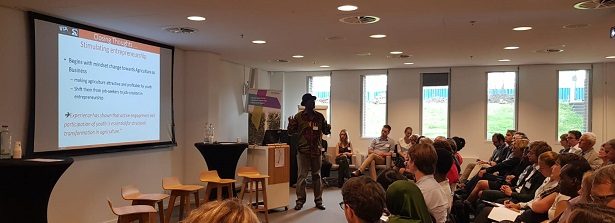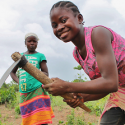The IITA Agripreneur Approach

The IITA Youth Agripreneur initiative (IYA) is a youth-in-agribusiness model which was established to address the issue of unemployment and also provide a platform along the agricultural value chain for unemployed youth to generate wealth and create jobs. What began as an experiment by IITA in 2012, has now grown into a successful model, which has led to its replication to other States in Nigeria – Kano, Abuja, Imo, Borno, and Rivers State, as well as to some countries—Tanzania, Kenya, DR Congo, Zambia, and Uganda.
The IYA model has the following elements: Mobilization, Mindset re-alignment, Training, Organizational Development, Mentorship and Coaching, and ultimately, Profitable venture development. It promotes agriculture as a business, and involves training in skills development in value chains as well as business plan and loan applications development.
The IYA program has a principal focus on graduate youths; however, links have also been created with rural youth development through projects. The model includes focus on graduate training to establish agricultural businesses in rural areas, engaging rural youth and training them to be able to establish their own businesses or engage in employment creation in existing agripreneur enterprises. In furtherance of the secondary focus on rural youth, IITA partnered in an initiative of MasterCard Foundation, that awarded a five-year, $13 million grant to Michigan State University to launch the Agrifood Youth Opportunity Lab (Ag Youth Lab), an international partnership to expand African youth entrepreneurship and employment in Africa, with Nigeria and Tanzania as focal countries. The Ag Youth Lab was designed to assist disadvantaged, out-of-school youth in accessing higher-wage jobs and starting businesses in various agriculture domains (horticulture, aquaculture, poultry, cassava and oilseed sectors).
In another initiative of rural youth entrepreneurship development, Chevron Nigeria Limited which has been involved in the exploration of crude oil from the Niger-Delta area of Nigeria, signed an agreement with IITA for agripreneurship development for the youth of the area. This is seen in the realm of corporate social responsibility, as a way of giving back to the society, through creating employment opportunities in agriculture and agribusiness for youth. The project, termed Community Youth in Agribusiness (CYAG), has run for two years, targeting 120 youths in eight communities. It entails both theoretical training and practical demonstration in their individual communities before they establish their own pilot fields.
With respect to scaling out, the IYA model has been adopted by the African Development Bank (AfDB) in the design of a Pan-African program aimed at creating jobs for African youth through agriculture. The program, known as ENABLE-Youth (Empowering Novel Agribusiness-Led Employment for Youth) will be implemented in many African countries. In this program, funding will be provided as loans to countries by AFDB to support enterprise and job creation for youths and women. So far 32 African countries have signed up to the program, and the process is at different levels of implementation in the various countries. The program has kicked off in Sudan with IITA providing technical expertise in youth agripreneurship, the pilot phase is currently on-going in Madagascar while Cameroon is in the preparatory stage. IITA through its cadre of trained youths has and will continue to provide the necessary support in advancing the ENABLE program in countries across the African continent.
Experience has shown that active engagement and participation of youth is essential for structural transformation in agriculture (see for example this blog). Using the IITA Youth Agripreneurs model, one can attest to the fact that with an enabling environment that will allow for mindset change and reorientation of youths about agriculture, coupled with training and incubation, young and unemployed graduates can succeed in generating employment and wealth through agriculture. The IYA model has also demonstrated links between graduate youth development and rural youth development and engagement. This linkage is projected to increase in the various countries and will require government policy support through incentive mechanisms and enabling environment linked to rural development strategies







I title this GREAT WINS because IYA are yet to win more.And am impressed because of what i see online about IYA.